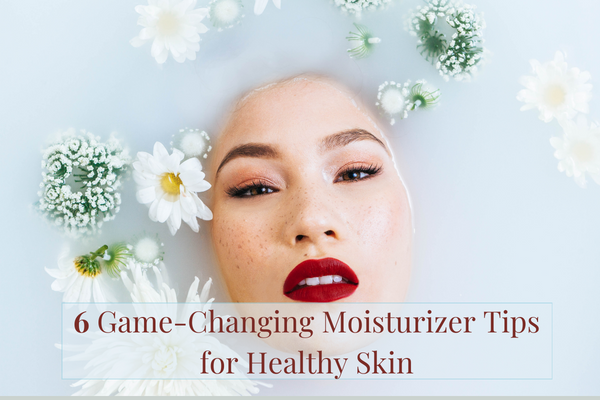Table of Contents
Toggle6 Game-Changing Moisturizer Tips for Healthy Skin
1. The Basics: What exactly is a moisturizer, and why is it a fundamental part of skincare?
Today, we’re diving into the world of skincare, specifically focusing on a fundamental component: the moisturizer. In the journey of becoming a healthcare expert, it’s crucial to grasp the significance of proper skincare not just for aesthetic reasons but also for the overall health of the skin. Let’s start with the basics – what exactly is a moisturizer, and why is it such an essential part of skincare?
Understanding the Skin:
Before we delve into the importance of moisturizers, it’s vital to understand the skin itself. Your skin is the largest organ of your body, serving as a protective barrier against environmental factors, such as bacteria, harmful UV rays, and pollutants. It also plays a crucial role in regulating body temperature and preventing excessive water loss. Healthy skin is not only a reflection of overall well-being but also a key aspect of patient care in the medical field.
What is a Moisturizer?
A moisturizer is a topical skincare product designed to hydrate and protect the skin. Its primary function is to improve and maintain the skin’s moisture levels. Moisturizers are available in various forms, including lotions, creams, and ointments, each with distinct characteristics suited to different skin types.
The Importance of Moisturizers:
- Hydration: The skin requires a certain level of moisture to function optimally. When the skin becomes dry, it can lead to various issues, such as itching, redness, and flakiness. A moisturizer replenishes lost moisture, keeping the skin hydrated and supple.
- Barrier Function: The outermost layer of the skin, known as the stratum corneum, acts as a barrier to protect the body from external elements. When this barrier is compromised due to dryness, it becomes less effective. Moisturizers aid in strengthening this barrier, enhancing its ability to protect the skin.
- Skin Health: Maintaining proper skin hydration contributes to its overall health. Adequate hydration helps prevent skin conditions like eczema, psoriasis, and dermatitis. It also supports the healing of minor wounds and abrasions.
- Anti-aging: Dry skin is more prone to premature aging. Using a moisturizer regularly can help reduce the appearance of fine lines and wrinkles, promoting a youthful complexion.
- Cosmetic Enhancement: In the medical field, skincare isn’t solely about health; it’s also about confidence. Well-hydrated skin looks more radiant, which can boost a patient’s self-esteem.
2. Types Matter: Explore the Different Types of Moisturizers and Their Unique Qualities
Before delving into the types of moisturizers, let’s first grasp the importance of using them. The skin is our body’s largest organ, acting as a protective barrier against external elements. Proper moisturization is vital because it:
- Retains moisture: Moisturizers help lock in the skin’s natural hydration, preventing dryness and dehydration.
- Supports skin barrier function: A well-moisturized skin barrier is better equipped to ward off pathogens and environmental damage.
- Reduces signs of aging: Moisturizers can help diminish the appearance of fine lines and wrinkles.
- Improves skin texture: Regular use of moisturizers can lead to smoother and softer skin.
Understanding the Types of Moisturizers
- Humectants Humectants are a type of moisturizer that draws moisture from the environment into the skin. They are best suited for people with dehydrated skin. Available humectants are glycerin and hyaluronic acid. These moisturizers provide a boost of hydration and keep the skin feeling plump and supple.
- Emollients Emollients are designed to fill in the spaces between skin cells and seal in moisture. They are great for those with dry or sensitive skin. Ingredients like shea butter, coconut oil, and ceramides are often found in emollient-based moisturizers. They create a protective layer on the skin’s surface, preventing water loss and maintaining a smooth texture.
- Occlusives Occlusive moisturizers are thick and heavy, forming a barrier on the skin to reduce water loss. These are ideal for individuals with severely dry or damaged skin. Common occlusive ingredients include petrolatum and beeswax. While occlusives are excellent at retaining moisture, they may feel greasy and are best used in small amounts.
- All-in-One Moisturizers Some moisturizers combine the properties of humectants, emollients, and occlusives in one product. These are versatile and can cater to various skin types. If you’re unsure about your skin’s specific needs, an all-in-one moisturizer can be a good starting point.
3. Hydration Heroes: Understand how moisturizers keep your skin hydrated and prevent dryness


Before we explore the role of moisturizers, it’s important to understand the skin’s natural barrier. The outermost layer of our skin called the stratum corneum, acts as a barrier that prevents water loss and protects us from external threats. This protective barrier is crucial for maintaining skin health.
Hydration and Skin Health
The human body is composed of a significant amount of water, and maintaining proper hydration is essential for our overall health, including our skin. When our skin becomes dehydrated, it can lead to various issues such as dryness, itching, and even skin conditions like eczema. Additionally, well-hydrated skin is more resilient and has a youthful appearance.
How Moisturizers Work
- Sealing in Moisture: Moisturizers are designed to lock in moisture and prevent it from escaping from the skin. They contain occlusive agents that form a protective layer over the skin’s surface, reducing water loss through evaporation.
- Attracting Moisture: Humectants, another essential component of moisturizers, draw moisture from the environment and the deeper layers of the skin to the surface.
3. Repairing the Skin Barrier: Some moisturizers also contain ingredients that aid in repairing the skin barrier. These include ceramides, which are naturally found in the skin and help maintain its integrity.
4. Choose Wisely: Learn how to select the right moisturizer based on your skin type.
Before delving into the world of moisturisers, it’s important to identify your skin type. Each type requires a different approach when it comes to moisturizing.
- Oily Skin If your skin is oily, using a moisturiser may seem like a bad idea. However, even oily skin needs hydration. Look for lightweight, oil-free, or non-comedogenic moisturisers. These products are formulated to keep your skin hydrated without adding extra oil. Ingredients like hyaluronic acid and glycerin are excellent choices for oily skin.
- Dry Skin Dry skin craves moisture and can benefit from richer, more emollient moisturisers. Opt for products that contain ingredients like ceramides, shea butter, or oils such as coconut or jojoba. These ingredients help to lock in moisture and provide a protective barrier against external factors.
- Combination Skin The combination of oily and dry skin poses a particular challenge. In this case, you should consider using different moisturisers for different areas of your face. Use a lightweight, oil-free moisturiser on the T-zone (forehead, nose, and chin) and a richer moisturiser on the cheeks, where the skin tends to be drier.
- Sensitive Skin Sensitive skin requires extra care when selecting a moisturiser. Look for products that are hypoallergenic and free from fragrances and common irritants. Ingredients like chamomile and aloe vera can be soothing for sensitive skin. Conduct a patch test to ensure the product doesn’t cause any adverse reactions
5. Moisturizer Selection Tips
Now that you know your skin type, here are some tips to help you select the right moisturiser:
- Read the Label: Always read the ingredient list. Look for products with ingredients that cater to your skin’s needs and avoid those that could potentially irritate your skin.
- SPF Protection: If you’re going to be exposed to the sun, consider a moisturiser with SPF. Sun protection is essential to keeping skin in good condition.
- Hydration vs. Occlusives: Hydrating ingredients like hyaluronic acid provide moisture, while occlusives like petrolatum create a barrier to prevent moisture loss. Choose a product that balances both according to your skin type.
- Test Before Committing: To avoid potential adverse reactions, test a small amount of the moisturiser on a small patch of skin and monitor for any signs of irritation.
- Seek Professional Advice: If you’re uncertain about your skin type or need personalized recommendations, consult a dermatologist or skincare professional
6. Routine Rules: When and How to Apply Moisturizer for Optimal Results in Your Skincare Routine
Maintaining healthy, radiant skin is a goal that many of us share. While we often focus on cleansing and choosing the right skincare products, one essential step that sometimes gets overlooked is moisturizing. Proper moisturization is a cornerstone of any effective skincare routine. In this blog, we’ll explore the when and how of applying moisturizer to help you achieve optimal results.
Understanding the Importance of Moisturizing
Before we delve into the specifics, let’s establish why moisturizing is so crucial. Our skin, the body’s largest organ, plays a vital role in protecting us from environmental stressors. To perform this role effectively, it needs to be well-hydrated. Moisturizing helps maintain the skin’s natural barrier, preventing dehydration, and protecting it from irritants, pollutants, and harmful UV rays.
- RELATED ARTICLES
- Moisturisers Unleashed: The #1 Secret to Beautiful Skin

